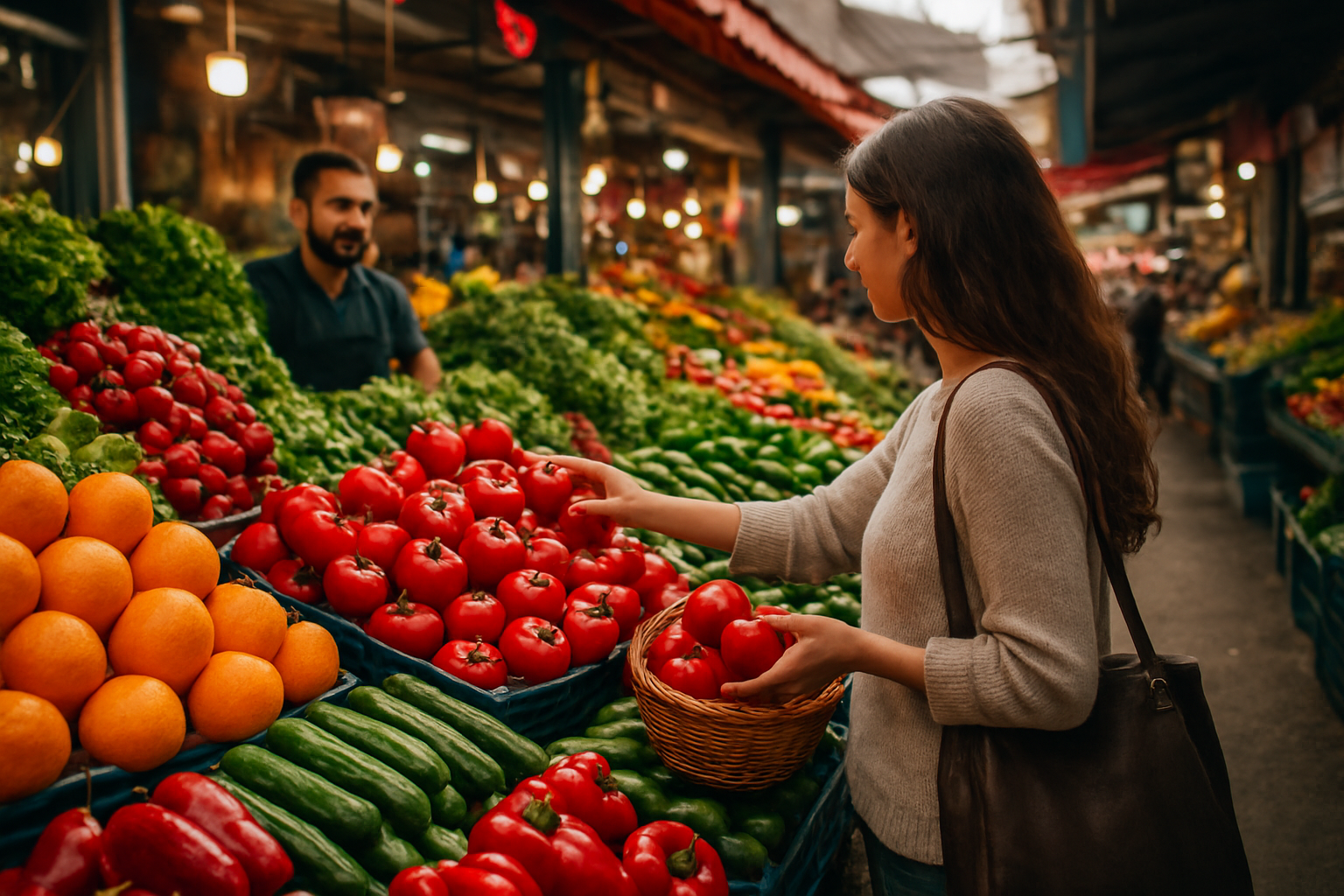Grocery Shopping in Turkey: Supermarkets and Markets

Moving to a new country brings a long checklist: housing, registration, language, and daily routines like grocery shopping. You juggle time, budgets, and the desire to eat well. In Turkey, grocery shopping offers a range of options from international-format supermarkets to neighborhood open-air pazars. This post helps you choose where to shop, save money, and enjoy local produce without wasting time or feeling overwhelmed.
Supermarkets: Convenience and consistency
Supermarkets serve busy expats who value predictability and speed. Chains like Migros, CarrefourSA, BIM, A101 and SOK spread across cities and towns. You find familiar-brand products, pre-packaged goods, and refrigeration systems that maintain quality.
Supermarkets work well for weekly stocking and for weekdays when you need to get in and out quickly. Most stores accept credit and debit cards, contactless payments, and mobile wallets. Larger stores often offer loyalty cards and shopping apps that help you track discounts and plan trips.
- Long opening hours in urban areas
- Fixed prices and barcodes for quick checkout
- Value packs and familiar brands
- Ready-to-eat sections and refrigerated staples
Example: Pick up milk, toilet paper, and a jar of Turkish coffee at a supermarket on your first day. You save time and avoid hunting for specialty vendors before you settle in.
Weekly pazars and farmers markets: Freshness and local flavor
Pazars give you fresh fruit, vegetables, cheeses, olives, and household items directly from producers. Local vendors arrive on scheduled days in each neighborhood. You find the best seasonal produce at lower prices than supermarkets.
Shopping at a pazar rewards you with tastings, friendly bargaining, and the chance to ask vendors about how locals cook certain ingredients. You build relationships and learn Turkish food vocabulary quickly.
- Seasonal fruits and vegetables at peak ripeness
- Direct contact with producers and small-scale sellers
- Lower prices for bulk purchases
- Unique items like fresh herbs, leaves for dolma, and specialty cheeses
Example: Buy summer melons and stone fruits at a Thursday pazar, then make fruit salads and jams for the week. You will save money and eat fresher food than supermarket alternatives.
Where to buy specific items: quick guide
You can split shopping across outlets for cost efficiency and quality. Choose vendors based on the product type.
- Produce: Go to the pazar for the best seasonal prices and freshness.
- Bread: Visit the local bakery for daily breads like simit, pide, and crusty loaves.
- Meat and fish: Use neighborhood butchers and fishmongers for cuts and freshness.
- Dairy and cheese: Try small dairies or the dairy section in supermarkets for local cheeses like beyaz peynir and kasar.
- Pantry staples: Stock up at supermarkets for rice, pasta, oils, and spices.
Example: For a typical Turkish breakfast, combine fresh bread from the bakery, beyaz peynir from the dairy stall, olives from the pazar, and tomatoes and cucumbers from your local market. You create an authentic meal while using multiple shopping channels efficiently.
Payments, apps, and loyalty tips
Modern shopping in Turkey blends cash and digital payments. You will find card readers everywhere and contactless payments at major stores. Still, bring small cash notes for casual tips, small street vendors, and late-night purchases.
Use supermarket apps and loyalty cards to collect points and receive coupons. You can check weekly flyers online to plan purchases and combine discounts across stores. Also, consider local delivery services when you need groceries quickly.
- Carry small cash for pazars and corner shops
- Register loyalty cards for discounts and digital receipts
- Use grocery apps for price comparisons and delivery
- Bring a reusable bag; stores charge for plastic bags
Example: Scan a supermarket app before you go shopping to see a weekly promotion on olive oil. Pair that offer with a pazar visit for fresh vegetables to prepare a budget-friendly dinner.
Practical tips for expats: save time, money, and stress
Adopt a routine that fits your lifestyle. Plan one big supermarket run and one market visit per week. That balance gives you pantry stability and a stream of fresh produce.
Learn a few food terms in Turkish to speed up shopping and make connections with vendors. Words like “taze” (fresh), “kilo” (kilogram), and “tatlı” (sweet) help in negotiations and selections.
- Check market days for your neighborhood and set a weekly shopping schedule
- Bring your own bags to avoid extra costs and reduce waste
- Compare unit prices: supermarkets show prices per kilogram or liter
- Talk to vendors for cooking tips and recipe ideas
Example: If you live near a university, shop during early morning hours at the pazar to avoid crowds and get the best produce. That small change saves time and yields higher-quality items.
Grocery shopping in Turkey blends convenience with discovery. Use supermarkets when you need speed and consistency, and visit pazars when you want freshness, local flavors, and better prices. With a simple plan, you will eat well, spend wisely, and enjoy the food culture that makes daily life here rewarding.
